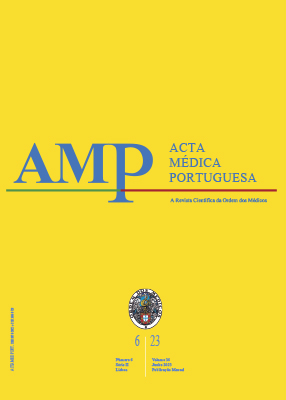Prenatal Diagnosis of Lissencephaly Associated with Biallelic Pathologic Variants in the COQ2 Gene
DOI:
https://doi.org/10.20344/amp.18606Keywords:
Lissencephaly/genetics, Malformations of Cortical Development, Mutation/genetics, Prenatal Diagnosis, UbiquinoneAbstract
Primary CoQ10 deficiency comprises several clinical phenotypes. Nevertheless, there are no reports so far of lissencephaly linked to CoQ10 deficiency. Lissencephaly is a developmental condition associated with defective neuronal migration which may be depicted on fetal neurosonography by persistence of a laminar pattern beyond 34 weeks and abnormal cortical sulcation. We report an index case of a male fetus diagnosed with abnormal lamination, characterized by the persistence of a laminar pattern during late pregnancy, following a normal second trimester scan. Post-natal whole exome sequencing revealed biallelic pathologic variants in the COQ2 gene which encodes an enzyme that is part of coenzyme Q10 (COQ10 or ubiquinone) pathway and is involved in the biosynthesis of CoQ, a redox carrier in the mitochondrial respiratory chain and a lipid-soluble antioxidant. This case underscores the heterogeneity of the prenatal phenotypic presentation of pathogenic variants in the COQ2, namely lissencephaly.
Downloads
References
Fragaki K, Chaussenot A, Benoist JF, Ait-El-Mkadem S, Bannwarth S, Rouzier C, et al. Coenzyme Q10 defects may be associated with a deficiency of Q10-independent mitochondrial respiratory chain complexes. Biol Res. 2016;49:4.
Abdelhakim AH, Dharmadhikari AV, Ragi SD, de Carvalho JR Jr, Xu CL, Thomas AL, et al. Compound heterozygous inheritance of two novel COQ2 variants results in familial coenzyme Q deficiency. Orphanet J Rare Dis. 2020;15:320.
Harel T, Hacohen N, Shaag A, Gomori M, Singer A, Elpeleg O, et al. Homozygous null variant in CRADD, encoding an adaptor protein that mediates apoptosis, is associated with lissencephaly. Am J Med Genet A. 2017;173:2539-44.
Mitani T, Punetha J, Akalin I, Pehlivan D, Dawidziuk M, Coban Akdemir Z, et al. Pathogenic variants in TUBGCP2 cause microcephaly and lissencephaly spectrum disorders. Am J Hum Genet. 2019;105:1005-15.
National Organization of Rare Diseases. Lissencephaly. [cited 2022 June 02]. Available from: https://rarediseases.org/rare-diseases/lissencephaly/.
Rakic P. Developmental and evolutionary adaptations of cortical radial glia. Cereb Cortex. 2003;13:541-9.
Pugash D, Hendson G, Dunham CP, Dewar K, Money DM, Prayer D. Sonographic assessment of normal and abnormal patterns of fetal cerebral lamination. Ultrasound Obstet Gynecol. 2012;40:642-51.
Fong KW, Ghai S, Toi A, Blaser S, Winsor EJ, Chitayat D. Prenatal ultrasound findings of lissencephaly associated with Miller-Dieker syndrome and comparison with pre- and postnatal magnetic resonance imaging. Ultrasound Obstet Gynecol. 2004;24:716-23.
Fragaki K, Chaussenot A, Benoist JF, Ait-El-Mkadem S, Bannwarth S, Rouzier C, et al. Coenzyme Q10 defects may be associated with a deficiency of Q10-independent mitochondrial respiratory chain complexes. Biol Res. 2016;49:4.
Downloads
Published
How to Cite
Issue
Section
License
Copyright (c) 2022 Acta Médica Portuguesa

This work is licensed under a Creative Commons Attribution-NonCommercial 4.0 International License.
All the articles published in the AMP are open access and comply with the requirements of funding agencies or academic institutions. The AMP is governed by the terms of the Creative Commons ‘Attribution – Non-Commercial Use - (CC-BY-NC)’ license, regarding the use by third parties.
It is the author’s responsibility to obtain approval for the reproduction of figures, tables, etc. from other publications.
Upon acceptance of an article for publication, the authors will be asked to complete the ICMJE “Copyright Liability and Copyright Sharing Statement “(http://www.actamedicaportuguesa.com/info/AMP-NormasPublicacao.pdf) and the “Declaration of Potential Conflicts of Interest” (http:// www.icmje.org/conflicts-of-interest). An e-mail will be sent to the corresponding author to acknowledge receipt of the manuscript.
After publication, the authors are authorised to make their articles available in repositories of their institutions of origin, as long as they always mention where they were published and according to the Creative Commons license.









